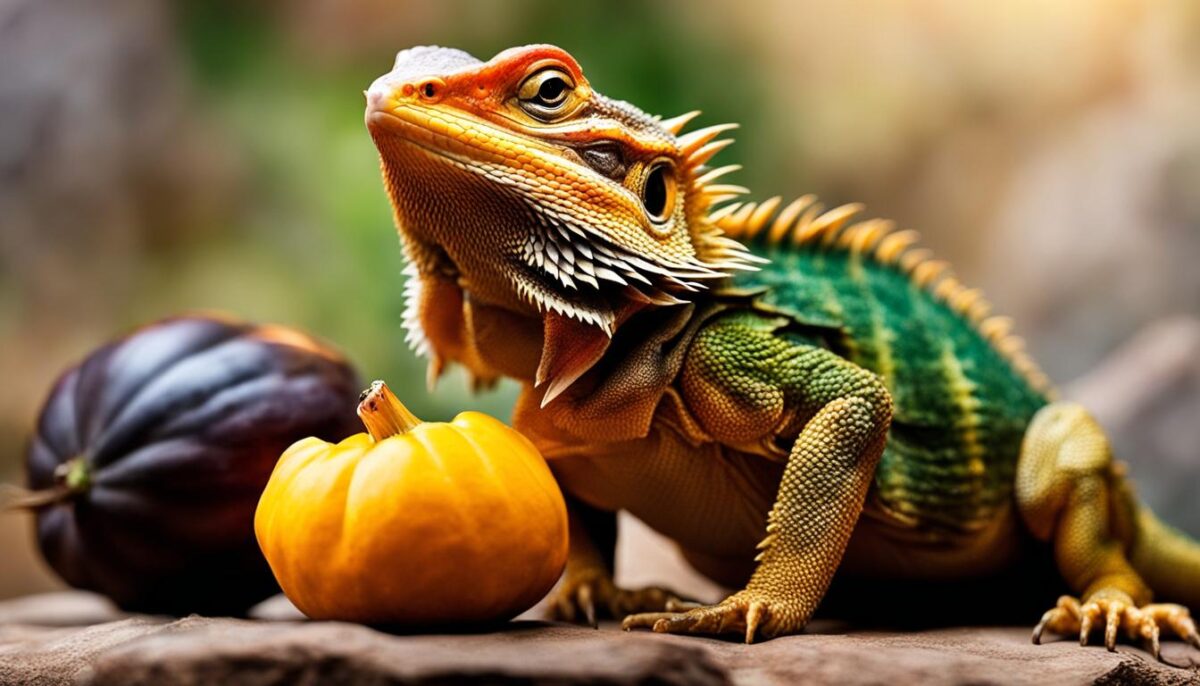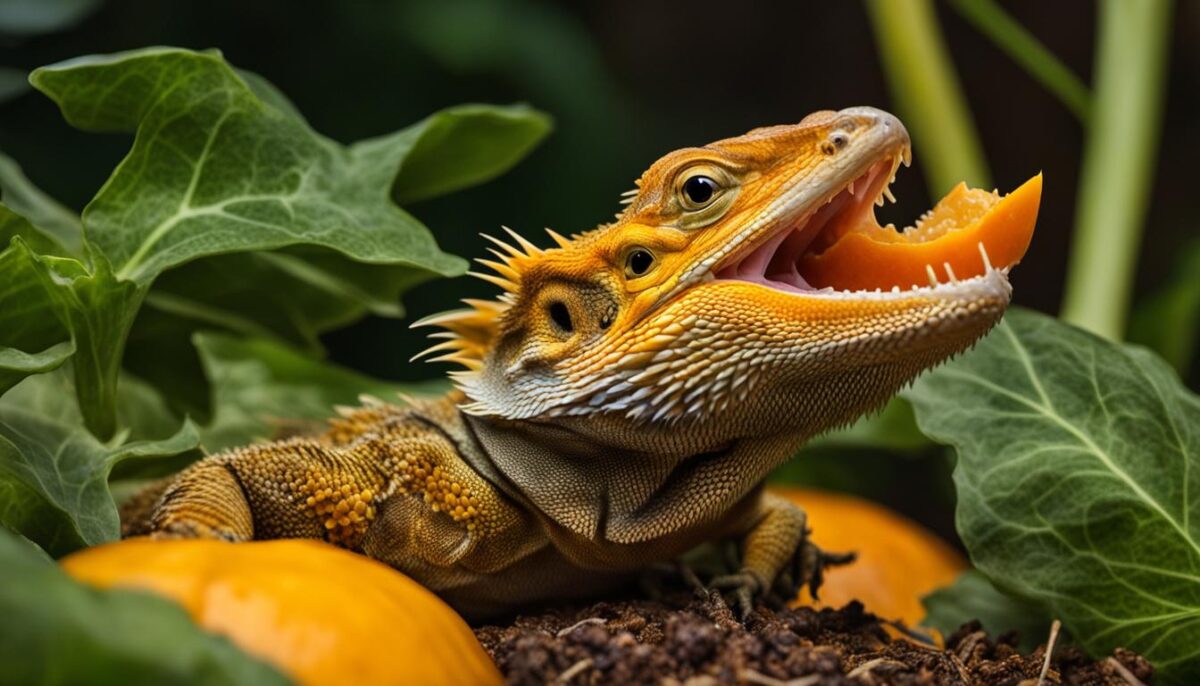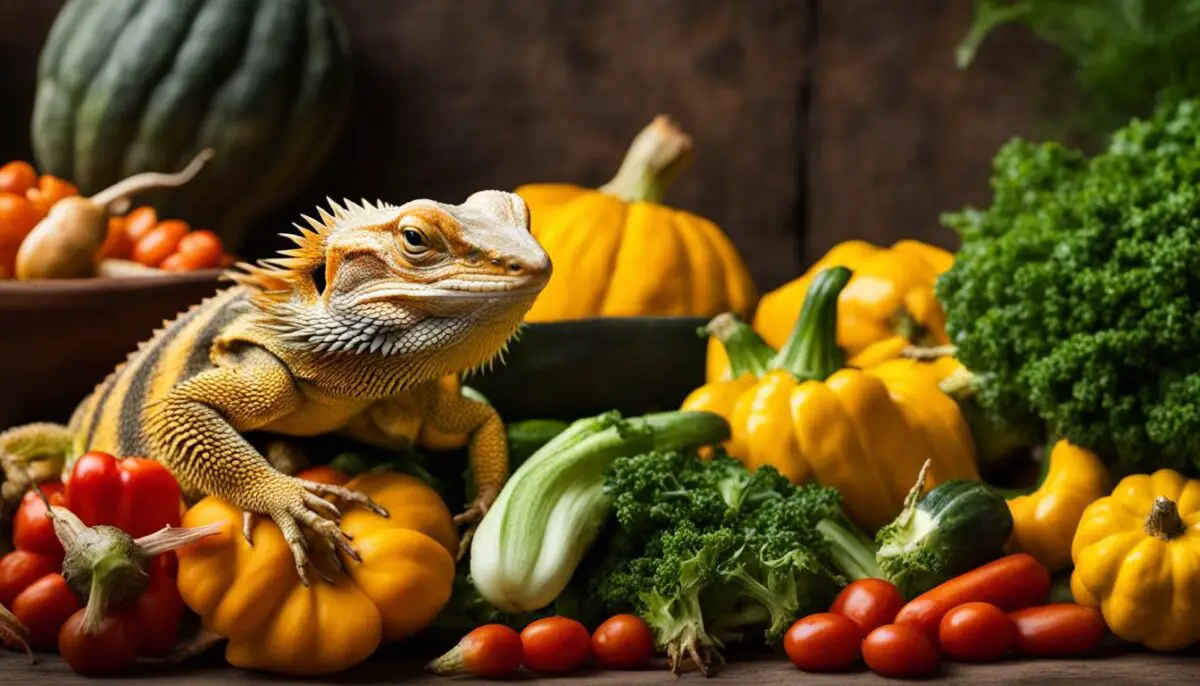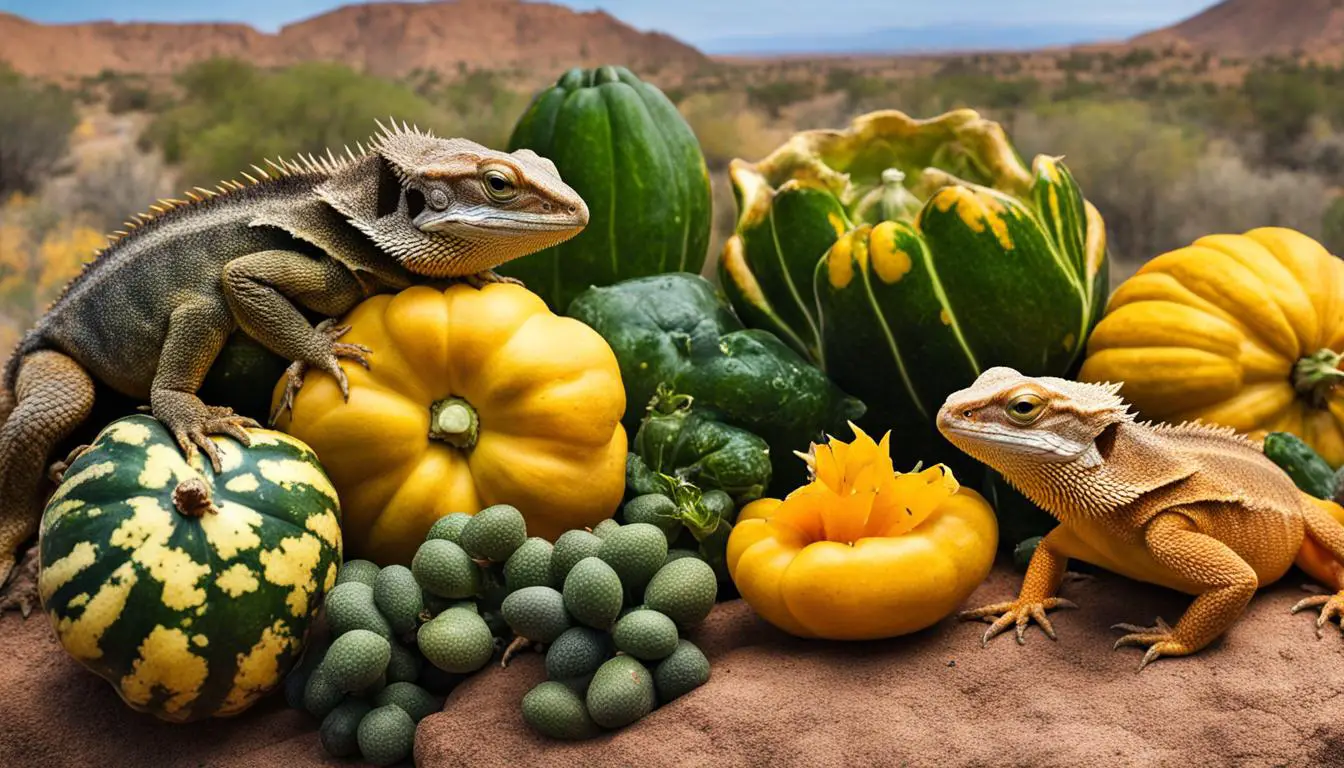Bearded dragons are fascinating reptiles known for their unique dietary needs. If you are a bearded dragon owner, you may be wondering if it’s safe to feed them acorn squash. Well, the good news is that bearded dragons can indeed enjoy this nutritious vegetable as part of their diet.
Acorn squash is packed with essential nutrients that benefit your bearded dragon’s health. It is rich in Vitamin C, Beta carotene, Vitamin A, B vitamins, Folate, Iron, and calcium. These nutrients contribute to their overall well-being and support their growth and development.
Adding variety to your bearded dragon’s diet is crucial, and including different types of squash, such as butternut squash, yellow squash, spaghetti squash, and acorn squash, can provide them with a range of nutrients. Acorn squash, in particular, has a calcium to phosphorus ratio of 1 to 1, which is ideal for bearded dragons.
Key Takeaways:
- Bearded dragons can safely eat acorn squash as part of their diet.
- Acorn squash is rich in Vitamin C, Beta carotene, Vitamin A, B vitamins, Folate, Iron, and calcium.
- Adding variety to their diet can provide them with a range of nutrients.
- Other safe squash varieties for bearded dragons include butternut squash, yellow squash, spaghetti squash, and more.
- Be sure to serve the squash raw or cooked, cut into small pieces, and dusted with a calcium supplement for proper nutrition.
Can Bearded Dragons Eat Acorn Squash
The Nutritional Value of Butternut Squash for Bearded Dragons
Butternut squash is a highly nutritious food that can be included in a bearded dragon’s diet on a daily basis. It is packed with essential vitamins and minerals that contribute to their overall health and well-being.
One of the key nutrients found in butternut squash is beta carotene, which is converted by the body into vitamin A. This vitamin is crucial for maintaining healthy skin, eyesight, and a strong immune system. Additionally, butternut squash is a good source of vitamin C, magnesium, and potassium, all of which help support the proper functioning of the bearded dragon’s body.can bearded dragons eat acorn squash
The calcium to phosphorus ratio of butternut squash is also favorable for bearded dragons, with a ratio of 1.5 to 1. Calcium is essential for maintaining strong bones and preventing bone disorders, while phosphorus helps with energy metabolism. By including butternut squash in their diet, bearded dragons can benefit from these important minerals.
The Nutritional Value of Butternut Squash for Bearded Dragons:
| Nutrient | Amount per 100g |
|---|---|
| Beta Carotene | 8,528 mcg |
| Vitamin C | 21 mg |
| Magnesium | 21 mg |
| Potassium | 352 mg |
| Calcium | 48 mg |
| Phosphorus | 30 mg |
When feeding butternut squash to bearded dragons, it is important to serve it cooked and cut into small, bite-sized pieces. This will make it easier for them to eat and digest. It should be offered alongside other vegetables and insects to ensure a varied and balanced diet.
Overall, butternut squash is a nutritious and beneficial addition to a bearded dragon’s diet. Its high nutritional value and favorable calcium to phosphorus ratio make it a great choice for promoting their health and well-being.bearded dragons diet
Including Yellow Squash in a Bearded Dragon’s Diet
Yellow squash is a nutritious and safe vegetable that can be included in a bearded dragon’s diet. It is a type of summer squash that provides a range of essential nutrients for their overall health and well-being.
When feeding yellow squash to your bearded dragon, it is important to serve it a few times a week. You can either offer it raw or cooked, but make sure it is cut into small, bite-sized pieces to prevent choking. Yellow squash contains important vitamins such as Vitamin C, Vitamin B6, and Vitamin A, which are essential for their immune system and overall growth.
In addition to vitamins, yellow squash is also a good source of minerals like Folate, Magnesium, Fiber, Riboflavin, Phosphorus, and Potassium. These minerals play a vital role in maintaining their bone health, promoting digestion, and supporting various bodily functions.
Benefits of Including Yellow Squash in a Bearded Dragon’s Diet:
- Provides essential vitamins like Vitamin C, Vitamin B6, and Vitamin A
- Contains minerals important for bone health and bodily functions
- A low-calorie option that can help prevent weight gain
- Offers hydration due to its high water content
When feeding yellow squash to your bearded dragon, it is always recommended to provide a balanced diet that includes a variety of vegetables and insects. This ensures they receive all the necessary nutrients for optimal health. Remember to dust their food with a calcium supplement to support their bone development, and monitor their overall well-being.acorn squash for bearded dragons
The Benefits of Acorn Squash for Bearded Dragons
If you’re a bearded dragon owner, you may be wondering whether acorn squash is a safe and nutritious food for your pet. The answer is yes! Acorn squash is a fantastic addition to a bearded dragon’s diet, offering a range of essential nutrients that can contribute to their overall health and wellbeing.

Acorn squash is rich in beta carotene, which is converted into Vitamin A in the bearded dragon’s body. Vitamin A is crucial for maintaining healthy skin, eyes, and a strong immune system. Additionally, acorn squash contains Vitamin C, B vitamins, Potassium, Fiber, Folate, Iron, Magnesium, and Manganese. These nutrients support various biological functions such as digestion, bone health, and energy production.
Table: Nutritional Content of Acorn Squash
| Nutrient | Amount per 100g |
|---|---|
| Beta Carotene | 4076 mcg |
| Vitamin C | 9.8 mg |
| Vitamin A | 198 IU |
| B Vitamins | Thiamin: 0.09 mg Riboflavin: 0.11 mg Niacin: 0.5 mg Pantothenic Acid: 0.6 mg Vitamin B6: 0.15 mg Folate: 14 mcg |
| Potassium | 347 mg |
| Fiber | 1.5 g |
| Iron | 0.8 mg |
| Magnesium | 20 mg |
| Manganese | 0.15 mg |
The calcium to phosphorus ratio of acorn squash is 1 to 1, making it an ideal food for bearded dragons. However, it’s essential to remember that acorn squash should be served alongside calcium-rich greens to create a balanced diet. Providing a variety of vegetables and insects, along with regular calcium supplementation, will ensure your bearded dragon receives the necessary nutrition for optimal health.bearded dragon food
So, go ahead and include acorn squash in your bearded dragon’s meal rotation. They’ll not only enjoy the taste but also reap the numerous benefits this nutritious vegetable has to offer.
Including Spaghetti Squash in a Bearded Dragon’s Diet
Spaghetti squash is a nutritious and delicious addition to a bearded dragon’s diet. It is packed with important nutrients that can support their overall health and well-being. Bearded dragons can safely eat spaghetti squash every day, making it a versatile option for their meal plans.
This type of squash is rich in Vitamin C, which is essential for boosting the immune system. It also contains Vitamin B6, Manganese, Niacin, Fiber, Potassium, Thiamine, Calcium, and Iron, providing a range of essential nutrients for bearded dragons. what can bearded dragons eat
When including spaghetti squash in a bearded dragon’s diet, it is important to cut the squash into small pieces to prevent choking. Bearded dragons should always be closely monitored while eating to ensure they are consuming their food safely. Additionally, it is recommended to dust the squash with a calcium supplement to ensure proper nutrition.
| Nutrient | Amount per 100g |
|---|---|
| Vitamin C | 9.2mg |
| Vitamin B6 | 0.1mg |
| Manganese | 0.5mg |
| Niacin | 0.5mg |
| Fiber | 1.5g |
| Potassium | 140mg |
| Thiamine | 0.1mg |
| Calcium | 20mg |
| Iron | 0.4mg |
By including spaghetti squash in their diet, bearded dragons can enjoy a tasty and nutritious meal option that provides them with the essential nutrients they need to thrive.
Other Squash Varieties for Bearded Dragons
If you’re looking to diversify your bearded dragon’s diet, there are a few other squash varieties that are safe for them to eat. Hubbard squash and scallop squash are two options that can be included in their reptile nutrition plan. Let’s take a closer look at these squash varieties and their nutritional benefits.bearded dragon care
Hubbard Squash
Hubbard squash is a nutritious addition to a bearded dragon’s diet. It is rich in Vitamin A, Vitamin C, and Manganese, which are essential for their overall health and well-being. Hubbard squash has a calcium to phosphorus ratio of 1 to 1.5, making it a balanced choice for their reptile diet. You can feed Hubbard squash to your bearded dragon a few times a week to provide them with the necessary nutrients.
Scallop Squash
Scallop squash is another safe vegetable that can be included in a bearded dragon’s diet. It is a good source of Vitamin C and Folate, which are important for their immune system and overall health. The calcium to phosphorus ratio of scallop squash is 1 to 2, making it slightly higher in phosphorus compared to other squash varieties. However, when paired with calcium-rich greens, it can still contribute to a balanced reptile nutrition plan. You can offer scallop squash to your bearded dragon once a week as part of their vegetable rotation.
By incorporating Hubbard squash and scallop squash into your bearded dragon’s diet, you can provide them with a variety of nutrients to support their health. Remember to serve the squash cooked or raw, cut into small pieces to prevent choking, and dusted with a calcium supplement for proper reptile nutrition. Always consult with a reptile care specialist or veterinarian for specific dietary recommendations for your bearded dragon.
| Squash Variety | Nutritional Benefits | Calcium to Phosphorus Ratio |
|---|---|---|
| Hubbard Squash | Vitamin A, Vitamin C, Manganese | 1:1.5 |
| Scallop Squash | Vitamin C, Folate | 1:2 |

Proper Feeding Tips for Bearded Dragons
Feeding bearded dragons a healthy and balanced diet is essential for their overall well-being. When it comes to feeding squash to these reptiles, there are a few important tips to keep in mind. Whether you’re serving raw or cooked squash, it should always be cut into small, bite-sized pieces to prevent choking hazards. Additionally, it’s crucial to provide a varied diet that includes a mix of vegetables and insects to meet their nutritional needs.
Bearded dragons require a calcium supplement to maintain their bone health. To ensure your dragon gets the necessary calcium, you can dust their squash and other food items with a calcium powder before serving. This will help them absorb the vital nutrients they need. However, it’s important to use the correct amount of calcium supplement as excessive calcium intake can lead to health issues.
When introducing new foods to your bearded dragon’s diet, it’s essential to monitor their reaction and digestion. Some dragons may have specific dietary restrictions or sensitivities, so it’s important to observe their behavior and overall health after introducing squash or any other new food. If you notice any adverse effects, such as lethargy or changes in bowel movements, consult a veterinarian who specializes in reptile care for guidance.
Feeding Schedule for Bearded Dragons
Establishing a consistent feeding schedule is crucial for the proper care of bearded dragons. Below is a sample feeding schedule to help you provide a well-rounded diet:
- Offer a variety of vegetables, including squash, 3-4 times a week.
- Provide insects, such as crickets or Dubai roaches, 3-4 times a week. The size of the insects should be appropriate for your dragon’s age and size.
- Include leafy greens, like collard greens or dandelion greens, in their diet on a daily basis.
- Offer fruits as occasional treats, but be mindful of their sugar content.
- Ensure fresh water is available at all times.
By following these feeding tips and providing a balanced diet, you can ensure the health and well-being of your bearded dragon. Remember to consult with a knowledgeable reptile veterinarian if you have any concerns or questions regarding your dragon’s diet or overall care.
Other Foods to Include in a Bearded Dragon’s Diet
While squash is a nutritious addition to a bearded dragon’s diet, there are other foods that can also provide essential nutrients. Here are some safe vegetables, fruits, and insects that you can include in your bearded dragon’s diet:
Vegetables:
- Collard Greens: Rich in calcium and Vitamin A, collard greens are a great addition to your bearded dragon’s diet. They provide essential nutrients for bone health and immune function.
- Dandelion Greens: These leafy greens are packed with vitamins and minerals such as calcium, Vitamin C, and iron. They also act as a natural diuretic, promoting healthy digestion.
- Carrots: Carrots are a good source of Vitamin A and beta carotene, which are important for eye health and immune function. Grate them to make it easier for your bearded dragon to eat.
Fruits:
- Papaya: Rich in Vitamin C and fiber, papaya can help promote healthy digestion in bearded dragons. It is best to offer small pieces of ripe papaya as an occasional treat.
- Blueberries: These antioxidant-rich berries can provide a boost to your bearded dragon’s immune system. Offer them as an occasional treat, as they are high in natural sugars.
Insects:
- Crickets: Crickets are a staple insect in a bearded dragon’s diet. They are a good source of protein and can be offered as live prey or dusted with a calcium supplement.
- Dubia Roaches: These roaches are another excellent source of protein for bearded dragons. They are easy to digest and provide essential nutrients for growth and development.
Remember to offer a balanced diet consisting of a variety of vegetables, fruits, and insects to ensure that your bearded dragon gets all the necessary nutrients. It is important to provide them with a diverse range of foods to mimic their natural diet in the wild. Additionally, always consult with a reptile veterinarian or herpetologist for specific dietary recommendations for your pet.

| Food | Nutrients | Feeding Frequency |
|---|---|---|
| Collard Greens | Calcium, Vitamin A | Several times a week |
| Dandelion Greens | Calcium, Vitamin C, Iron | Several times a week |
| Carrots | Vitamin A, Beta carotene | Occasional treat |
| Papaya | Vitamin C, Fiber | Occasional treat |
| Blueberries | Antioxidants | Occasional treat |
| Crickets | Protein | Offered as live prey or dusted with calcium supplement |
| Dubia Roaches | Protein | Offered as live prey |
Conclusion
In conclusion, including acorn squash in a bearded dragon’s diet can be a great way to provide them with important nutrients. Acorn squash, along with other varieties such as butternut squash, yellow squash, and spaghetti squash, is safe for bearded dragons to eat. Whether served raw or cooked, it is important to cut the squash into small pieces to prevent choking.
To ensure proper nutrition, bearded dragons should have a balanced diet that includes a variety of vegetables, fruits, and insects. In addition to squash, safe vegetables for bearded dragons include collard greens, dandelion greens, and carrots. Fruits should be offered in moderation due to their sugar content. Insects like crickets and Dubai roaches can also be included in their diet.
By following these proper feeding habits, you can ensure the health and well-being of your bearded dragon. Regularly dusting their food with a calcium supplement is also important to meet their nutritional needs. Remember to provide a varied diet and avoid feeding them foods that are toxic or high in sugar. With proper care and attention to their diet, your bearded dragon can thrive and lead a happy, healthy life.
FAQ
Can bearded dragons eat acorn squash?
Yes, acorn squash is safe for bearded dragons to eat.
How often can acorn squash be fed to bearded dragons?
Acorn squash can be fed a few times a week.
What nutrients does acorn squash provide to bearded dragons?
Acorn squash is rich in beta carotene, Vitamin A, Vitamin C, B vitamins, Potassium, Fiber, Folate, Iron, Magnesium, and Manganese.
What is the calcium to phosphorus ratio of acorn squash?
The calcium to phosphorus ratio of acorn squash is 1 to 1.
Can bearded dragons eat butternut squash?
Yes, butternut squash is a great food for bearded dragons.
How often can butternut squash be fed to bearded dragons?
Butternut squash can be fed to bearded dragons daily.
What nutrients does butternut squash provide to bearded dragons?
Butternut squash is rich in beta carotene, Vitamin C, Magnesium, Potassium, and antioxidants.
What is the calcium to phosphorus ratio of butternut squash?
The calcium to phosphorus ratio of butternut squash is 1.5 to 1.
Can bearded dragons eat yellow squash?
Yes, yellow squash can be included in a bearded dragon’s diet.
How often can yellow squash be fed to bearded dragons?
Yellow squash can be fed to bearded dragons a few times a week.
What nutrients does yellow squash provide to bearded dragons?
Yellow squash contains Vitamin C, Vitamin B6, Vitamin A, Folate, Magnesium, Fiber, Riboflavin, Phosphorus, and Potassium.
What is the calcium to phosphorus ratio of yellow squash?
The calcium to phosphorus ratio of yellow squash is about 1 to 1.8.
Can bearded dragons eat spaghetti squash?
Yes, bearded dragons can eat spaghetti squash.
How often can spaghetti squash be fed to bearded dragons?
Spaghetti squash can be eaten by bearded dragons every day.
What nutrients does spaghetti squash provide to bearded dragons?
Spaghetti squash is packed with Vitamin C, Vitamin B6, Manganese, Niacin, Fiber, Potassium, Thiamine, Calcium, and Iron.
What is the calcium to phosphorus ratio of spaghetti squash?
The calcium to phosphorus ratio of spaghetti squash is 2 to 1.
What other squash varieties are safe for bearded dragons to eat?
Hubbard squash and scallop squash are also safe for bearded dragons to eat.
How often can Hubbard squash be fed to bearded dragons?
Hubbard squash can be fed to bearded dragons a few times a week.
How often can scallop squash be fed to bearded dragons?
Scallop squash can be offered to bearded dragons once a week.
What other foods can be included in a bearded dragon’s diet?
Safe foods for bearded dragons include other vegetables, fruits, and insects such as collard greens, dandelion greens, carrots, crickets, and Dubai roaches.
How should squash be prepared for bearded dragons?
Squash should be served raw or cooked without any additional ingredients, cut into small pieces to prevent choking.
How should bearded dragons be fed for a balanced diet?
Bearded dragons should have a balanced diet that includes a variety of vegetables, fruits, and insects, and their food should be dusted with a calcium supplement.


